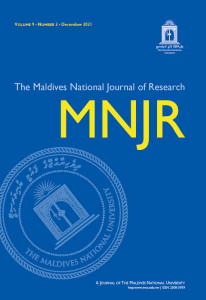Satisfaction of Caretakers towards Government’s Home Visit Program for Bedridden Patients in Greater Male’, Maldives: A descriptive study
DOI:
https://doi.org/10.62338/rx9zg923Keywords:
Caretakers, patient satisfaction, bedridden patients, home-visit program, Greater Male’Abstract
The home visit program for bedridden patients, implemented by the Government of Maldives, has been operating without undergoing any evaluation since its inception in 2015.. The objective of the study was to assess the satisfaction level of caretakers towards the government’s home visit program for bedridden patients. A descriptive study was carried out from February to July 2022 for all the registered bedridden patients at the main urban primary health care centres in the Greater Male’ region of the Maldives. 123 caretakers were interviewed using a 49-item research instrument. The most common caretaker of bedridden patients were the offspring of the patients (67%). Only 10% of the bedridden patients were taken care of by hired caretakers. The majority (78%) of the caretakers of bedridden patients were not trained. The median score for the overall satisfaction on the home visit program and for the services provided by the program were found to be high at 10 out of 10 (IQR: 2) and 11 out of 14 (IQR: 7). However, the median score for the satisfaction on procedures and training conducted during the program was low at 2 out of 12 (IQR: 6) and 5 out of 10 (IQR: 8). The study found that caretakers appreciate the overall program, and were satisfied with the services such as drug prescription services, general consultations and examinations. However, the satisfaction level was very low on the procedures conducted during the home visits and the training programs provided for the caretakers.
References
Al-Khashan, H., Mishriky, A., Selim, M., El Sheikh, A., & BinSaeed, A. A. (2011). Home caregivers’ satisfaction with the services provided by Riyadh Military Hospital›s home support program. Annals of Saudi medicine, 31(6), 591-597.
Florea, M., Puia, A., & Pop, R. S. (2020). The family as recipient and provider of home care: a primary care perspective. In Suggestions for Addressing Clinical and Non-Clinical Issues in Palliative Care. IntechOpen.
Gately, M. E., Tickle-Degnen, L., Trudeau, S. A., Ward, N., Ladin, K., & Moo, L. R. (2020). Caregiver satisfaction with a video telehealth home safety evaluation for dementia. International journal of telerehabilitation, 12(2), 35.
Greenwood, N., Mackenzie, A., Cloud, G.C., Wilson, N. (2009). Informal primary carers of stroke survivors living at home-challenges, satisfactions and coping: A systematic review of qualitative studies. Disabil Rehabil31, 337-51.
Guerriere, D., Zagorski, B., &Coyte, P., (2013). Family caregiver satisfaction with home-based nursing and physician care over the palliative care trajectory: Results from a longitudinal survey questionnaire. Palliative Medicine, 27(7), 632-638.
Hwang, D.Y., Yagoda, D., & Perrey, H.M., (2014). Assessment of satisfaction with care among family members of survivors in a neuroscience intensive care unit. Journal of Neuroscience Nursing, 46, 106–16.
Kokorelias, K., Gignac, M., Naglie, G., & Cameron, J. (2019). Towards a universal model of family centered care: A scoping review. BMC Health Services Research, 19(1). https://doi.org/10.1186/s12913-019-4394-5.
Manskow, U. S., Arntzen, C., Damsgård, E., Braine, M., Sigurdardottir, S., Andelic, N., ... & Anke, A. (2018). Family members’ experience with in-hospital health care after severe traumatic brain injury: a national multicentre study. BMC Health Services Research, 18(1), 1-10.
Ministry of Gender & Family Maldives. (2018). Promotion and Protection of the Rights of Children, Women, Elderly and Persons with Disabilities 2013-2018; 9. http://gender.gov.mv/wp-content/uploads/sites/2/2018/11/Report-on-the-Promotion-and-Protection-of-Children-Women-Elderly-and-Persons-with-Disabilities-2013-%E2%80%93-2018-FINAL-7.docx-1.pdf
Miyashita, M., Misawa. T., Abe, M., (2008). Quality of life, day hospice needs, and satisfaction of community-dwelling patients with advanced cancer and their caregivers in Japan. Journal of Palliative Medicine, 11(9), 1203-1207.
Olazarán Rodríguez, J., Sastre Paz, M., & Martín Sánchez, S. (2012). Health care in dementia: Satisfaction and needs of the caregiver. Neurología (English Edition), 27(4), 189-196. doi: 10.1016/j.nrleng.2011.07.001.
Park, Y. H. (2008). Day healthcare services for family caregivers of older people with stroke: Needs and satisfaction. Journal of Advaced Nursing, 61, 619-30.
Ploeg, J., Valaitis, R. K., Cleghorn, L., Yous, M. L., Gaber, J., Agarwal, G., ... & Dolovich, L. (2019). Perceptions of older adults in Ontario, Canada on the implementation and impact of a primary care programme, Health Teams Advancing Patient Experience: Strengthening Quality (Health TAPESTRY): a descriptive qualitative study. BMJ open, 9(6), e026257.
Prasad, B., & Rani, N. I. (2007). Older persons, and caregiver burden and satisfaction in rural family context. Indian Journal of Gerontology, 21(2), 216-232.Puri, S. (2004).
Supporting family care of older persons, a paper presented at the. In National Consultative meeting on Emerging Issues in Care of Older Persons in India (Vol. 4).
Singer, E. S., Merritt, R. E., & D’Souza D. M. (2019). Patient satisfaction after lung cancer surgery: Do clinical outcomes affect HCAHPS scores? Annals of Thoracic Surgery. 108,(6), 1656-1663.
Sulmasy D., McIlvane, J. M., Pasley, P.M. (2002). A scale for measuring patient perceptions of the quality of end-of-life care and satisfaction with treatment: The reliability and validity of QUEST. Journal of Pain Symptom Management, 23(6), 458-470.
Vogel, R., McGraw, C., Orlando, A., Bourg, P., Dreiman, C., Peck, L., ... & Bar-Or, D. (2019). Examining satisfaction of older adult patients and their caregivers following traumatic injury: a cross-sectional study of three level I trauma centres. BMJ open, 9(11), e032374.
Wei, S. P., Shih, S. C., Lin, S. C., Liu, C. J., Lu, Y. W., & Chang, W. L. (2011). Primary caregivers satisfaction and its related factors in home health care services. International Journal of Gerontology, 5(2), 107-111.
Welch, S. J. (2010). Twenty years of patient satisfaction research applied to the emergency department: a qualitative review. American Journal of Medical Quality, 25(1), 64-72.
World Health Organization. (2019). Regional Office for South-East Asia. Review of initiatives on long-term care for older people in Member States of the South-East Asia Region World Health Organization. Regional Office for South-East Asia 2019; https://apps.who.int/iris/handle/10665/331448. License: CC BY-NC-SA 3.0 IGO.



